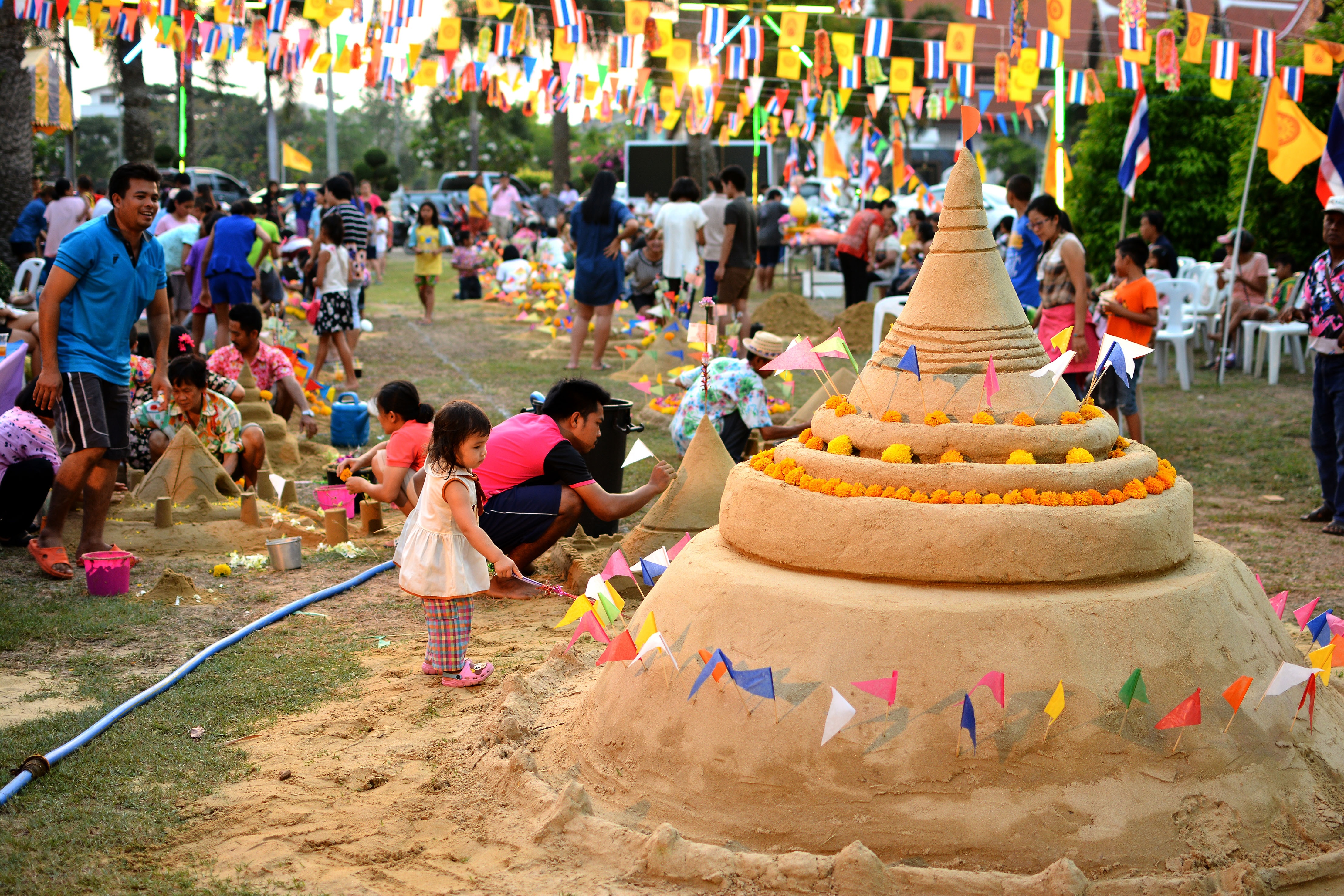The Essential Guide to Songkran, the Thai New Year Festival
Songkran (or Thai new year) festival is the traditional new year celebration in Thailand. It is celebrated annually with official fixed dates between 13-15 April, but holiday celebrations commonly extend throughout the whole week (in 2026, from Monday 13th until Sunday 19th of April).
Songkran is a Buddhist festival founded on the traditional Buddhist calendar and the festival is celebrated similarly in other Buddhist communities around the region, such as in Laos, Cambodia and Myanmar.
Perhaps the most famous format of the modern Songkran celebrations are the grand communal water fights. This phenomena well deserves it's title as "the largest water fights in the world", although it is impossible to determine which district in fact hosts the largest water battle, as there are contenstants in most districts in every city of the Kingdom!
Although the modern day water fights are a huge escalation of the age-old traditions, the festival traditions have in fact always revolved around water. Many of the more traditional Buddhist activities are still cherished by Thai community. Since 2023, Thai New Year Songkran has been recognized as part of the list of UNESCO Intangible Cultural Heritage of Humanity.
In this guide we will give a comprehensive overview of what Songkran is all about. We cover the origins of Songkran festival, take a focused view on the modern ways to celebrate, as well as give a brief coverage of the traditional festival activities.
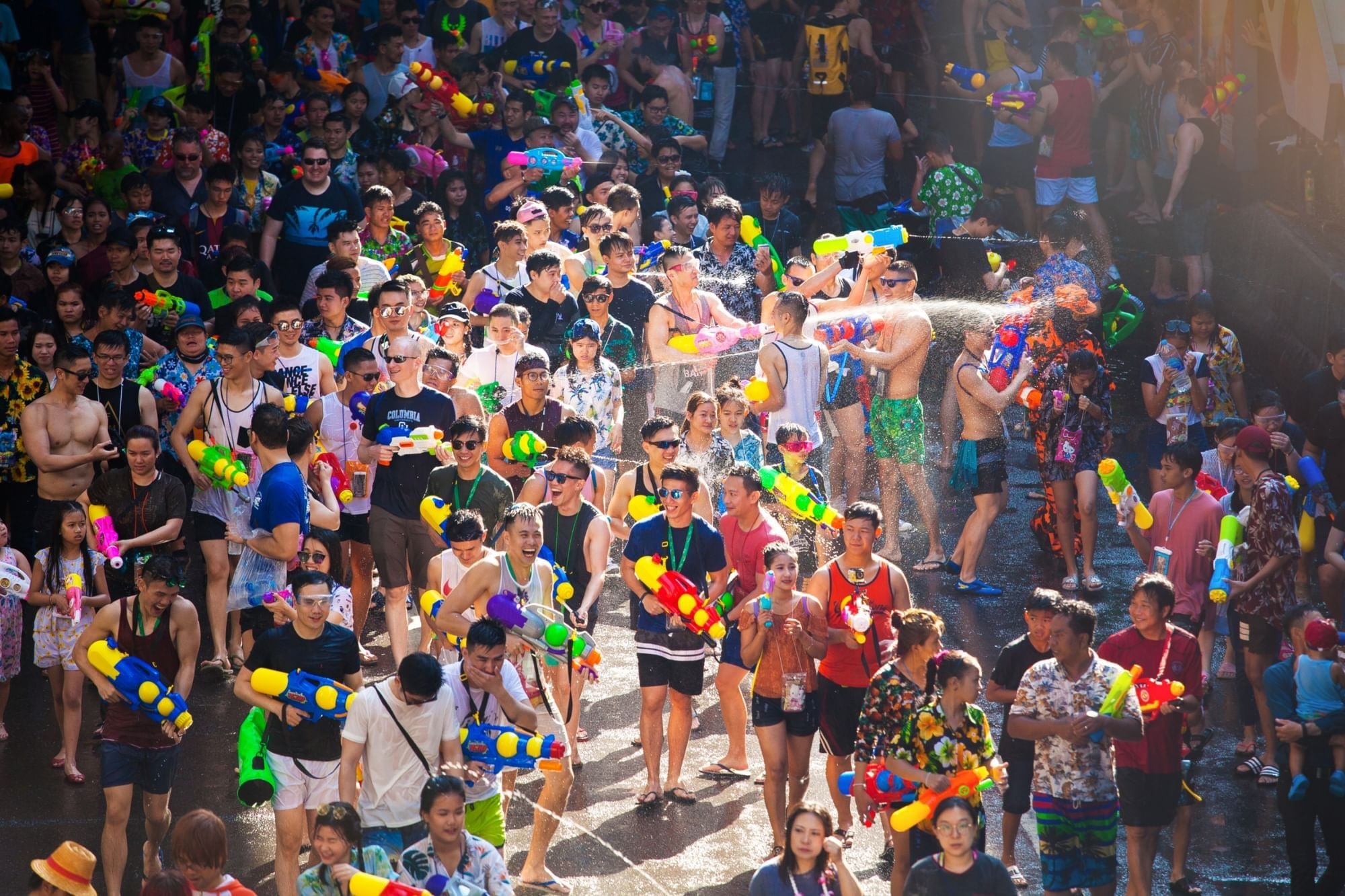
Origins of Songkran
The Buddhist New Year celebrations can be traced way back, with various historical recordings of Buddhist New Year celebrations dating back more than a millenia.
The word "Songkran" itself derives from Sanskrit (language of Buddhism and the origin of Thai script), meaning "to move" or "to change". It refers to the astrological passage, describing the movement of the sun from one position to another in the zodiac, marking the beginning of the new year.
Similarly to the western New Year, the symbolical meaning of Songkran is to move forward - start fresh - with the use of some water, to flush away any bad karma or other misfortunes, from the previous year.
Role in Thai culture and society
In the modern times, Thai Buddhist New Year or Songkran, is the most important annual festival in the Kingdom of Thailand. This time is typically devoted to family, as many locals travel back to hometowns and provinces to reunite with their families and loved ones in a quest to welcome new year and all new opportinities that comes with it.
Up until 1941, Songkran marked the official start of a new calendar year. But since then, Thailand syncronized the official Thai calendar year with the Gregorian calendar, with the new calendar year beginning on January 1st.
This move was not significant enough to undermine the importance of Songkran in Thai society, and Songkran is still the main event of the year, with fixed official dates of celebration occurring between April 13th to 15th.
Official Thai calendar follows the Buddhist year counts, which is a whopping 543 years ahead of the Gregorian calendar! It means that in 2026 (Gregorian calendar) Thailand celebrates a New Year #2569!
Songkran also marks the beginning of a shift in season, with gradual arrival of the monsoon rains. This is another significant symbolic factor in heavily agriculture-driven Thai society, and yet another good reason to celebrate the occasion with plenty of water!
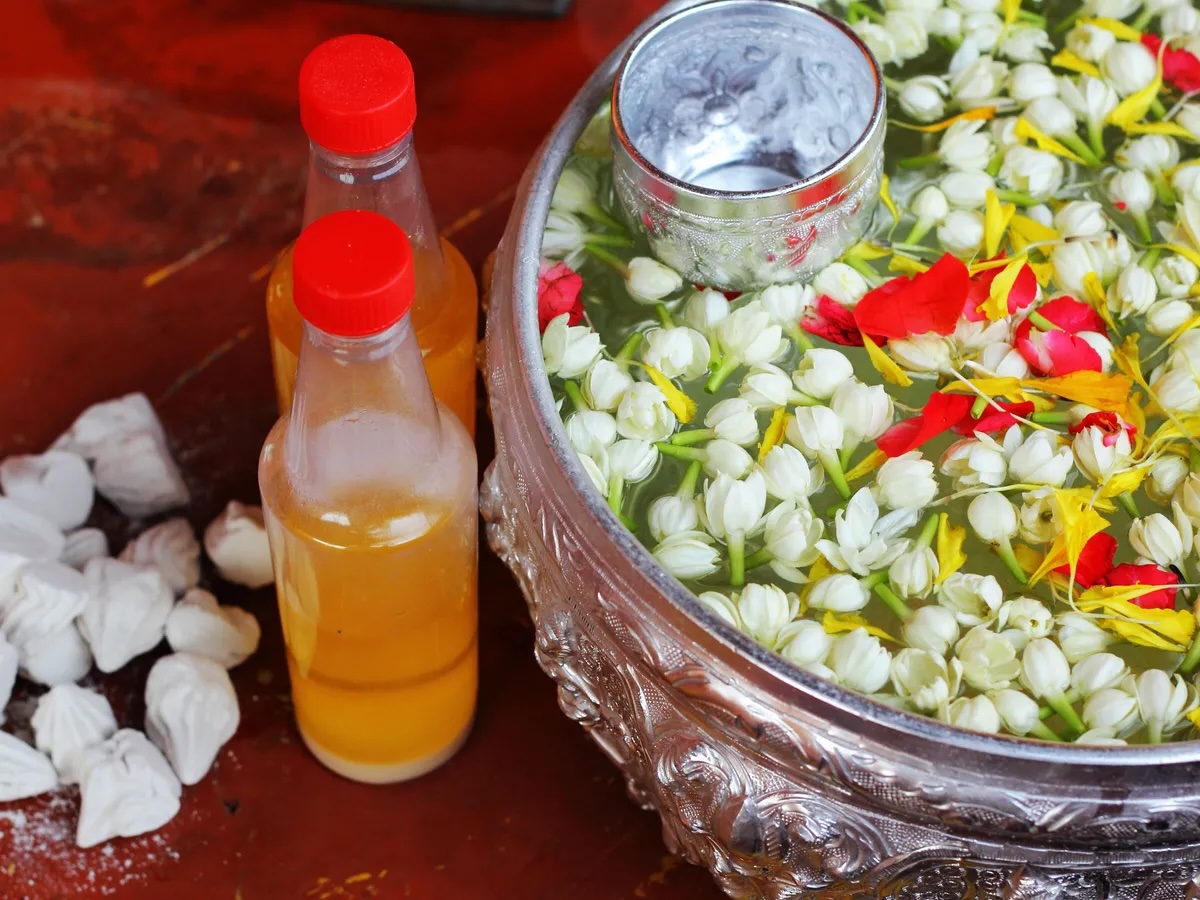
Weather conditions during Songkran Festival
Celebrated from April 13th to 15th, it is the peak of the summer and hottest time of the year in Thailand. You can expect weather to stay hot and dry in Bangkok with temperatures reaching up to 40°C (104°F).
Up north in Chiang Mai, the weather is somewhat cooler with temperatures hovering around 30°C (86°F). In the south and around beach destinations, like Phuket, weather is hot and humid with temperatures mostly below 35°C (95°F) while high humidity might make it feel milder but even wetter than elsewhere.
All in all, you may prepare very light clothing that dries quick, along with a waterproof bag for keeping electronics and spare cash safe. It is also equally important to remember constantly apply sunscreen and stay hydrated! More preparation tips can be found in our Songkran preparation guide.
Water all around
The grand water fights are of course the main event of modern Songkran festivities. These water battles span all across the nation, from the crowded Bangkok hotspots to the local communities, with younger folk seizing control of neighbourhoods and village strips with loaded super soakers and icy cold buckets of water.
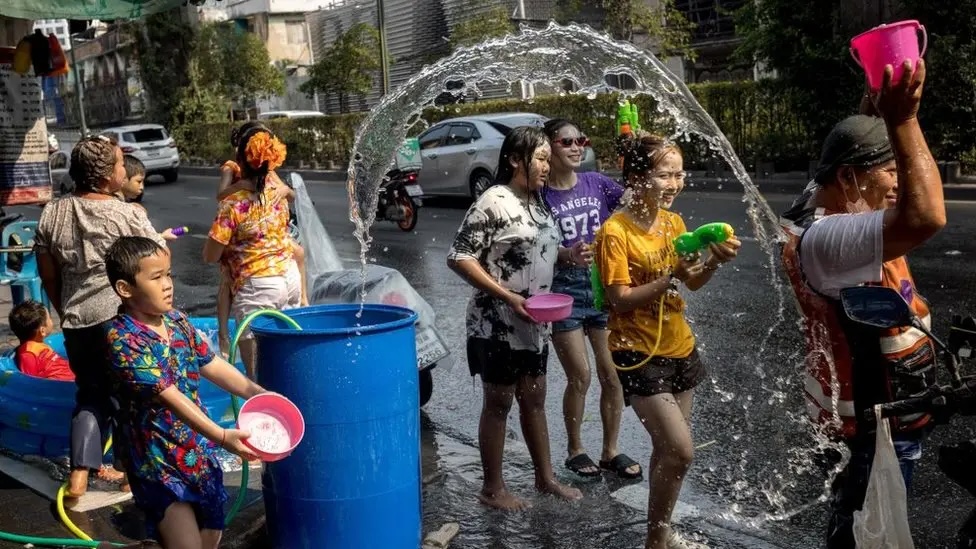
Why water battles?
Although It is a tradition that continues to escalate, activities around water have always been at the core of Thai New Year celebrations. The role of water in the celebrations is to symbolically wash away any misfortune or bad luck from the previous years, wishing for a fresh start in the new year.
Especially in the old days, the most common ways that water was applied to traditional Songkran celebrations were to bathe Buddha images and wash hands of elders and temple monks. Friends would gather and to only gently sprinkle small amounts on water over each other, as a gesture of good wishes for the new year ahead.
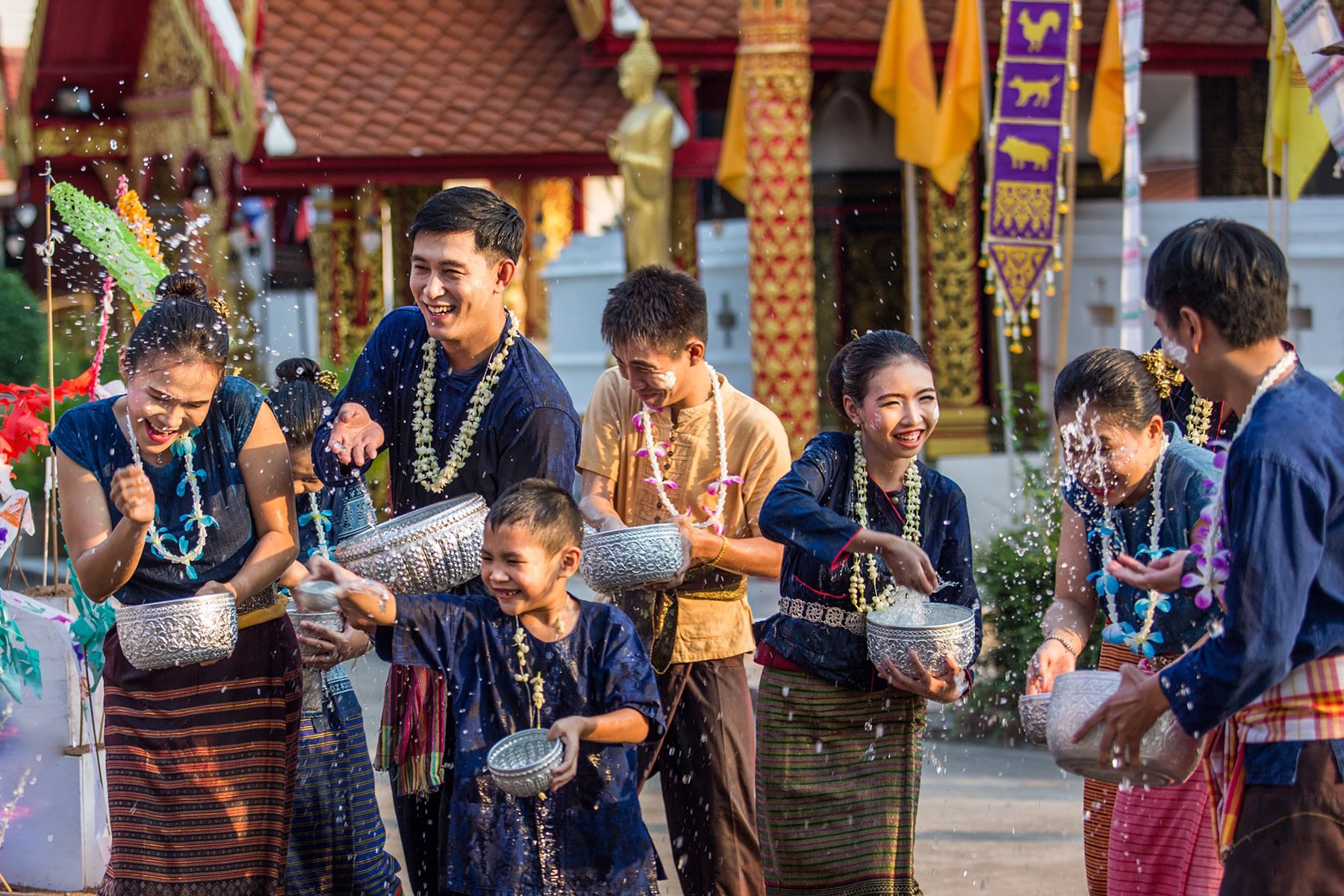
These days, locals, expats and tourists alike, young and old, gather to the main streets and neighbourhoods to greet each other happy new year in a bit larger scale, equipped with super soakers and fire hoses, causing a world-renowned splash!
Where to find the best water fights
Songkran is celebrated nationwide, with each province having their own favored locations for water battles with some regional specialties! We have written guides to cover many of the main water battle zones. Here is a quick recap:
In Bangkok the main water battles are held in Siam Square, Silom Road and Khao San Road.
Siam Square and Silom Road are perhaps the more suitable for families, especially if you go at earlier time of the day. These two are also the most accessible locations by public transport.
Silom Road has the biggest singular area dedicated for water fights with the whole 4km stretch of main business district road reserved specifically for water battles. It is also the LGBT district bringing a significant LGBTQ flavour to the festivities.
Khao San Road is the most famous backpacker area, and hence especially popular location for foreign tourists. It is less easily accessible by public transport. With it's constant party vibe continuing until the late hours of the night, Khao San attracts loads of young and party loving crowd.
Chiang Mai is a city for hard-core Songkran celebrations. The city hosts massive public water battles around the edge of the old city at Tha Phae Gate. Other main areas are around trendy Nimman neibourhood and at the Central Shopping malls.
Chiang Mai is also a notable city for it's culture and old Lanna culture, so it is a great place to experience some of the more traditional Songkran celebrations!
The resort town of Pattaya hosts some of the wildest and wettest water fights on the planet. The epicenter of water battles is the Beach Road, where the central strip is lined up with stages and markets to cater and entertain the veterans of the water wars.
Phuket is a large tropical island with dozens of beaches and towns scattered along the coastline. The craziest of parties you would find from the famous axis of Patong Beach and Bangla Road.
Although Phuket is especially famous for catering to millions of tourists every year, there are also large local communities and you can join the more local water fight zones around Phuket Town.
Krabi is a most famous province for its beautiful nature with picturesque limestone cliffs and many tropical islands. On the mainland the mainland Ao Nang and Krabi Town host the main water battles. On Phi Phi Island you will find wild water battles attracting especially younger crowds. Ko Lanta is much more laid-back, but you can join the local communities and tourists alike in the Lanta Old Town water fights.
In Surat Thani you find the famous island of Ko Samui that hosts large water fights among crowds of visitors and locals alike. Next island to the north is Ko Phangan where the famous Full Moon Party takes place, hosting one event conveniently during Songkran.
Maximise enjoyment with good preparation
We wrote a comprehensive guide on how to prepare for Songkran celebrations with checklists and whole lot of tips. Songkran preparation.
As key takeaways from the article, you should:
- wear light cheap clothing (Hawaii shirt gives you extra points)
- waterproof bag for safely carrying your belongings
- goggles to protect your eyes from the super soaker snipers
- use plenty of sunscreen and
- stay hydrated!
Please also remember that even if your intension is to avoid all water battles, you might not be able to do so! Our best advise is to preset a relaxed mindset and prepare to say Mai Pen Rai! once your tuxedo get soaked by an incoming bowl of ice water!
Other modern forms of Songkran celebrations
Fun-loving and open-minded Thais have no troubles to adopt new activities from other cultures into the modern Songkran celebrations, while proudly preserving the core cultural identity, of course. Various types of music festivals, street parades and diverse cultural shows play an important role in the celebrations.
Music festivals
There are many music festivals taking place during Thai New Year celebrations whether it is EDM, K-Pop or Thai pop and rock music. Most of the times these festivals blend in interesting mix of Thai Songkran culture in the form of architecture, design, drinks and snacks and of course, in the form of water!
Here's a few great music festivals around the country that takes place during Songkran time:
S2O Music Festival (Bangkok)
S2O Music Festival is a popular EDM music festival that takes place in Rajamangala National Stadium in Bangkok. This 3-day festival draws in some of the biggest DJs in the electronic music scene.
Summerland Songkran Music Festival (Bangkok)
Summerland Music Festival is a 4-day festival that collects the brightest stars of Thai rock and pop music and brings about one of the most authentic local festival experiences that you should not miss!
Street markets & parades
Thais love markets, and it's easy to understand why! During Songkran you can find local Songkran-festival markets in major temples, parks and university campus areas.
You will find stalls selling absolutely delicious street food, including desserts and "royal meals" that are commonly found only during special festivals. Most of the customers in these markets are local couples and families, with people of all ages enjoying the relaxed atmosphere and fun activities.
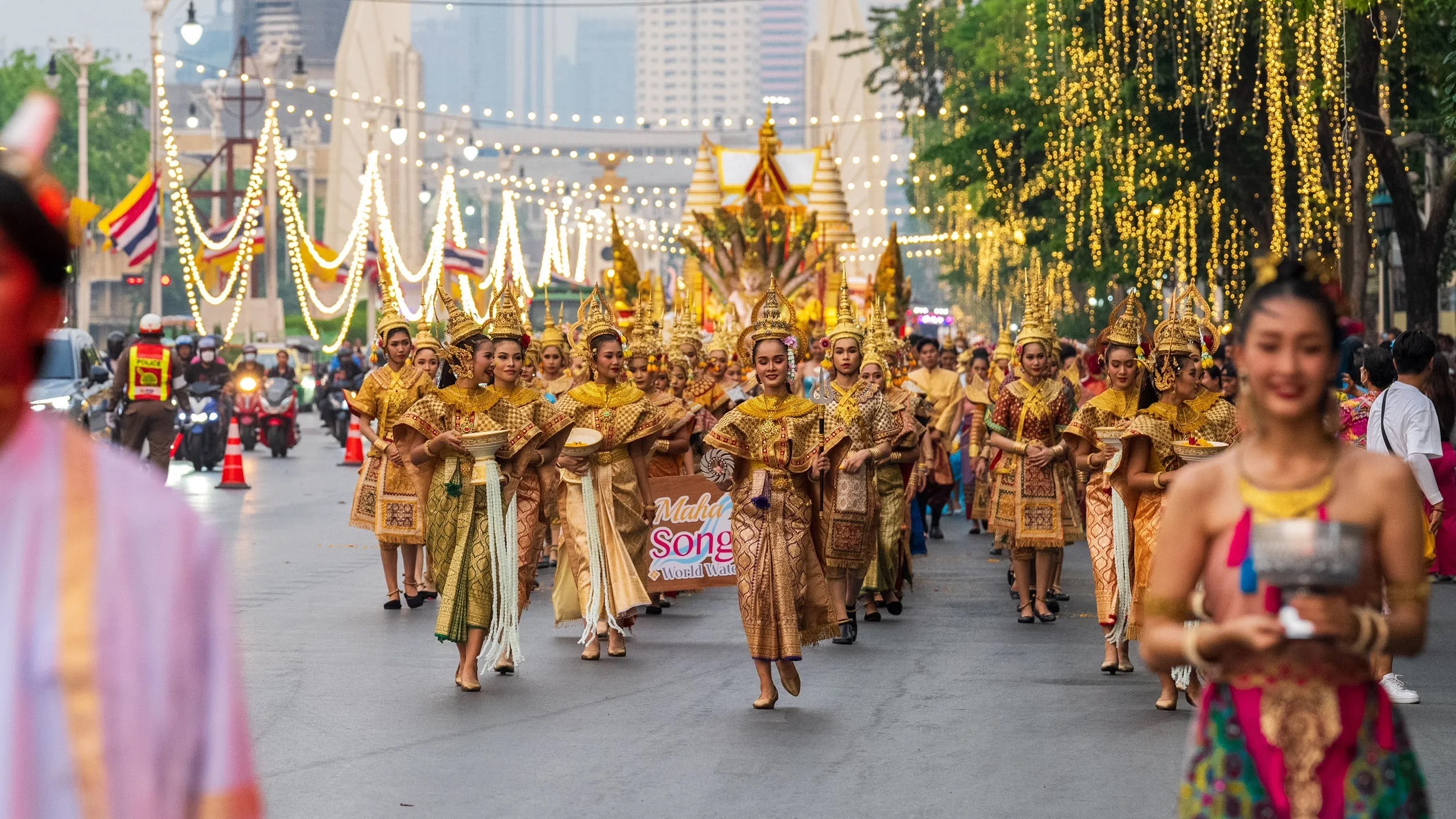
Traditional Songkran celebrations
As mentioned before, Songkran festival has it's foundation in the ancient Buddhist New Year celebrations. For a very good reason, Thais are very much proud of the rich cultural and religious heritage, and it is no wonder that many very old Songkran traditions are still actively practiced today.
Merit making at temples
Early in the mornings from 13th to 15th April, it is common to visit local temples to make merit and seek blessings from the temple monks. Ways of making merit can vary from donating food, to offering money or building materials for the temple's construction.
Buddhist praying ceremonies are held, and anyone is welcome to join. Ceremonies of Rod Nam Dam Huua are also held, where temple visitors pay respects to monks or senior members of the community by pouring scented water over their hands or feet.
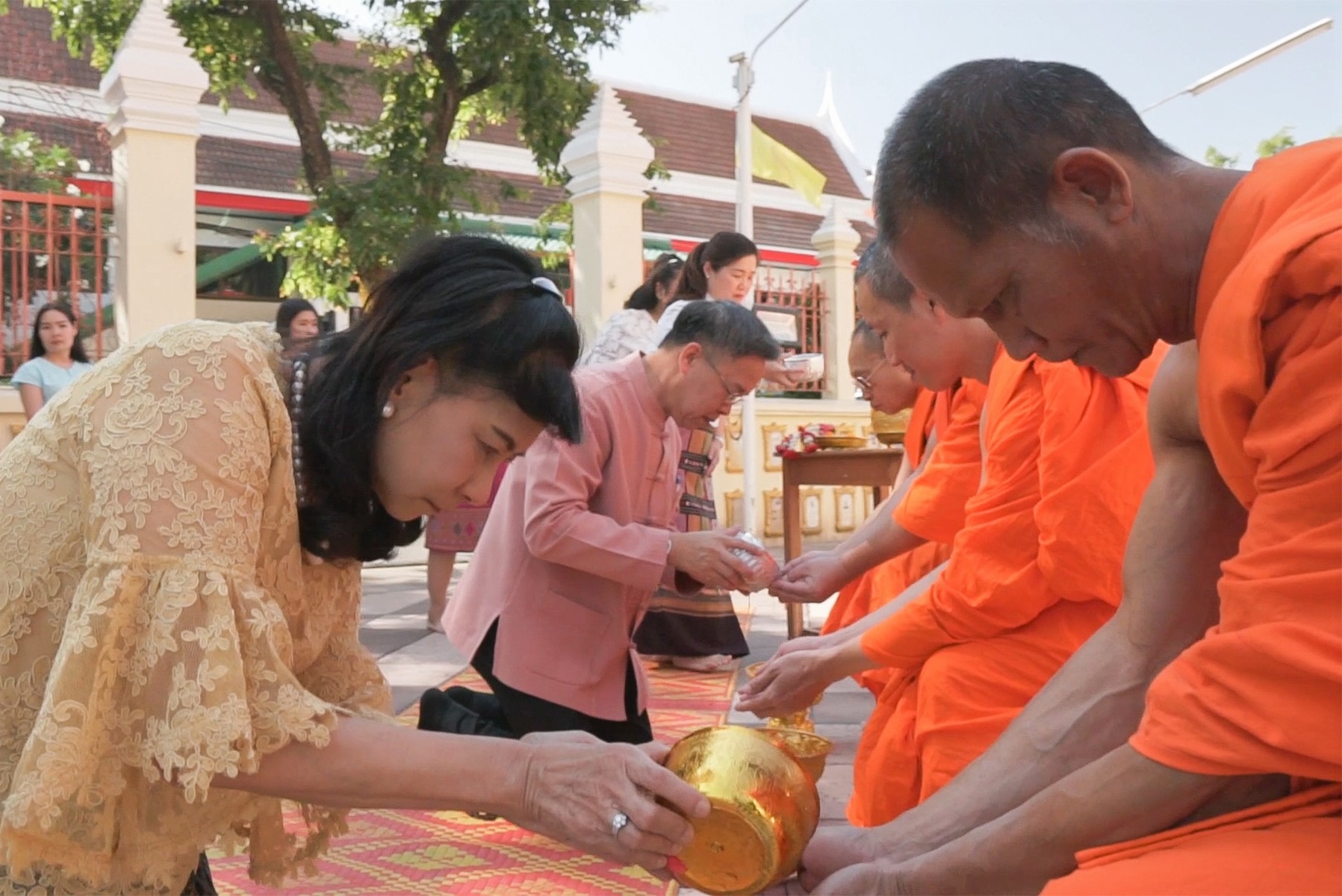
Rod Nam Dam Huua
As described above, Rod Nam Dam Huua is a blessing ceremony, where younger individuals pay respects to elders by pouring scented water over, most commonly, their hands. In temples this is performed on the monks, and in homes it is performed on the elders such as grandparents and parents.
It is considered a way of merit-making, and it is believed to bring good blessings and positive karma through the signs of respect and gratitude for the elders.
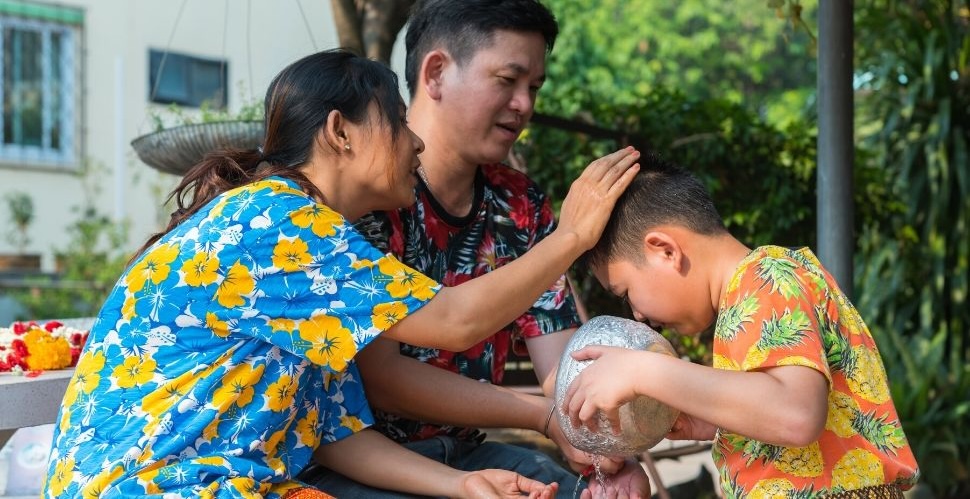
Song Nam Phra (Bathing Buddha images)
If you happen to see a Buddha altar with silver bowl filled with water in a hotel or condo lobby during Songkran, it is most likely prepared for the Song Nam Phra!
Song Nam Phra is a ritual with very similar meaning and concept to Rod Nam Dam Huua. The idea is to show respect and good deeds (and collect good karma) when bathing and cleaning the Buddha statue with scented water (traditionally scented with a Thai perfume called nam ob). This ritual is believed to be a way of paying respect to the Buddha statue and to bring good fortune to the person.
In Song Nam Phra we use the small silver bowls and gently pour flower scented water on the Buddha statue, around the shoulders and back of the Buddha image. This symbols respect and gratitude towards the teachings of Buddha, and helps to wash away any bad karma and start off fresh in the new year.
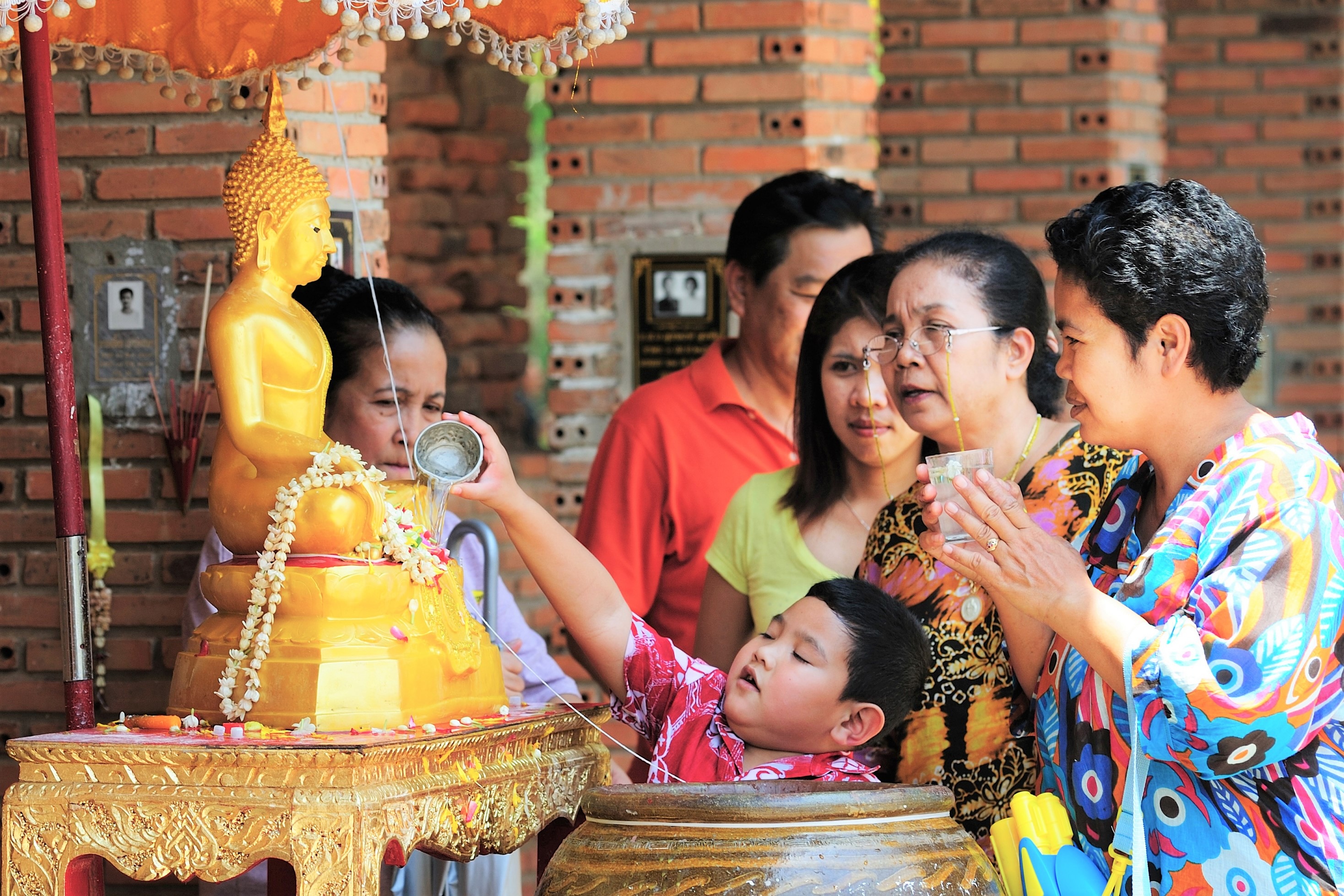
Building Sand Pagodas (Chedis) in a local temple
Building sand pagodas is a very old new year tradition that you can do in most temples around the country. Competitions take place in some of the temples yielding sometimes very creative and artistic perceptions of sand pagodas.
For Buddhists, bringing sand to the temple is a way of giving back—replacing what’s been carried away on people’s feet over the year. Much like sand castles that you are used to build, the idea is to shape it into little pagodas and decorate the pagodas with flags and zodiac symbols. Finished product becomes a beautiful symbol of renewal and respect.
It is common to bring your own sand which will be granted as a donation and used as construction material in the temple. Unlike many of the festival activities, this one has no prescribed common date, and you may craft sand pagodas at any day during the Songkran week.
